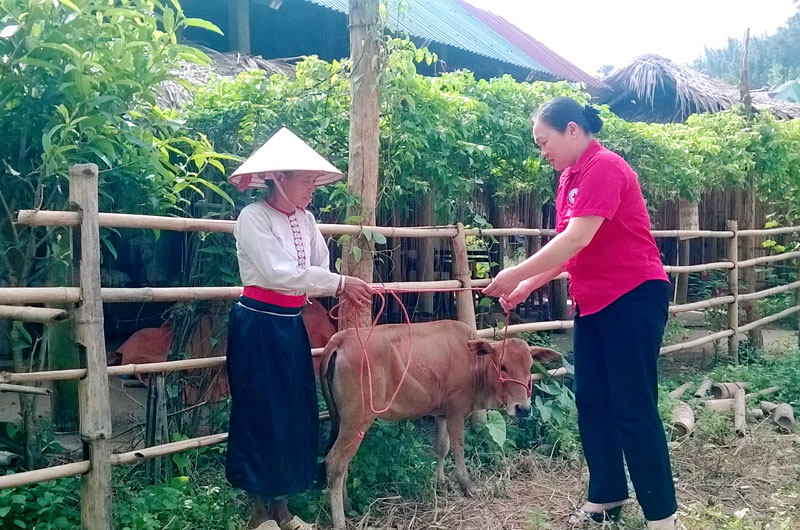
(HBO) - Giap Dat is a heavily disadvantaged commune in Da Bac district. It houses eight hamlets and 501 households of four ethnic groups. The Tay and Dao ethnic groups account for 81.5 percent and 15.6 percent of the commune’s total population, respectively. Local people mainly depend on agricultural production, which has been facing various difficulties; hence the high rate of poor households. By the end of 2018, the rate was 46.67 percent.

Representative of a poor family in Dat 4 hamlet, Giap Dat commune (Da
Bac), receives breeding cows from a charity programme.
In the past years, with support
from different development projetcs, particularly Program 135, Giap Dat’s socio-economic
growth has progressed. Under a programme on assisting production development in
2017 and 2018, 28 local poor families were assigned to take care of seven
breeding cows.
Giap Dat has also received
capital to invest in local socio-economic infrastructure projects, including an
800m road leading to the Suoi Cuom production area and a 150m canal in Dat 3
hamlet. The road project cost a total of 927 million VND, of which local people
donated 27 million VND. The figures for the canal project were 500 million VND
and 50 million VND, respectively. Local people also contributed hundreds of
working days to both projects.
In addition, following the motto "the State
and people work together", the commune has maintained and repaired sewers
and roads in Dat 4 hamlet as well as the Na Ria ditche in Dat 3 hamlet. It has
also implemented a production support programme, providing nearly 70,000 saplings
of wood trees to 56 poor households of four hamlets – Dat 1, 2, 3 and 5.
With just over a month left until the school summer break, students are eagerly anticipating a period of rest and fun after a year of academic pressure. To provide a healthy environment for the physical development, in addition to the classes that foster talents and enhance the academic knowledge, sports and physical activities continue to attract a large number of children and teenagers.
On April 17th, Hoa Binh Provincial Museum organized a program to promote and introduce the outstanding values of "Hoa Binh Culture” at the Boarding Secondary and High School for ethnic minority students in Mai Chau District.
The Hoa Binh College of Technical Technology, in collaboration with the Hoa Binh Technical and Economic College and the provincial Association of Literature and Arts, hosted a gathering on April 15 to celebrate Laos’ traditional Bunpimay (New Year) Festival 2025 and debut the new book "Nguoi Muong o ban Don” (Muong people in Don village).
In the millennia-long history of national construction and safeguarding, people of all ethnic groups in Hoa Binh have been united and closely bound together to overcome all difficulties and challenges, standing alongside the entire Vietnamese people throughout the history of building and defending the country.
Living green is a healthy, positive, and sustainable lifestyle that not only helps protect
the environment and quality of life but also conserves natural resources and ecosystems.
Among the many ways to embrace this lifestyle, reducing plastic consumption is one of the most impactful.
The women's unions at all levels in Kim Boi district have been making significant contributions to the movement of building cultural life in the local community.
The movement helps improve rural look and the spiritual and material lives of local residents.



